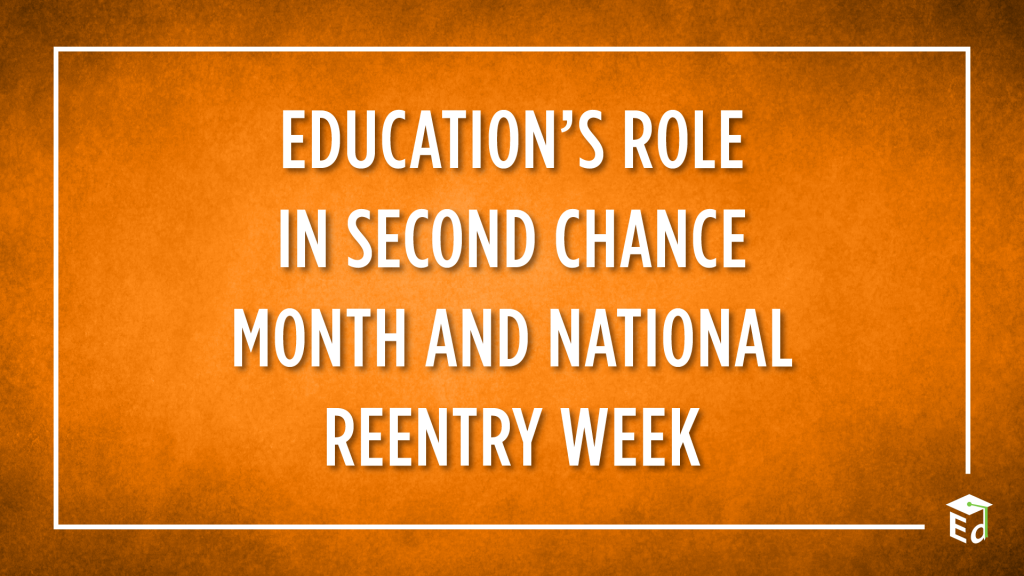Education’s Role in Second Chance Month and National Reentry Week

By:
Sean Addie – Director of Correctional Education
Dr. Amy Loyd – Acting Assistant Secretary
This week we are joining our colleagues at the U.S. Department of Justice, agencies across the federal government, and our partners across the country to mark National Reentry Week and lift up the important work being done to support individuals reentering society from incarceration. The week also bookends Second Chance Month, and here at the Department of Education, we understand the pivotal role that education plays in helping people rejoin and contribute to society.
Education can have a transformational impact on an individual’s life –– and education plays a vital role in easing an individual’s reentry from jail or prison back into society. In a major study of those released from state prisons, 94% of incarcerated adults nearing release identified education as a key reentry need. According to a 2018 study funded by the Department of Justice and conducted by the RAND Corporation, incarcerated individuals who participated in high-quality correctional education were 48% less likely to return to prison within three years than those who didn’t participate in correctional education. More than 600,000 people leave federal and state prisons each year, and our communities have a stake in ensuring that those individuals equitably reenter society educated, prepared for meaningful employment, reconnected with family and loved ones, and ready to resume or begin productive lives.
Providing high-quality educational opportunities to incarcerated individuals and those reentering society can also play a critical role in advancing the Biden Administration’s commitment to racial equity and economic justice. Black, Latino, and Indigenous people in our country are incarcerated at disproportionately high rates, and already face discrimination in the labor market. Systemic racism has put the promise of America out of reach for too many people, and our agency has a role to play in ensuring more equitable outcomes for people as they leave the justice system.
Multiple offices at the Department of Education have work that intersects with justice system-involved individuals and individuals who will be reentering. For example, our Office of Elementary and Secondary Education operates the Title I, Part D, Neglected, Delinquent, or At-Risk formula grant program and a technical assistance center to improve educational services for students in local, tribal, and state institutions. These grants include services that provide children and youth returning from correctional facilities or institutions with a support system to ensure their continued education and the involvement of their families and communities as well as opportunities to build knowledge and skills to help them successfully transition back to schools, homes, and communities. The Office of Federal Student Aid operates the Experimental Sites Initiative, which includes providing Pell Grants to a limited set of incarcerated students under the Second Chance Pell Experiment. The Office of Special Education and Rehabilitative Services has technical assistance centers and resources for individuals with disabilities who are involved in the justice system, and our Office of Career, Technical, and Adult Education has several technical assistance initiatives working to improve reentry for incarcerated individuals.
With the passage of the Consolidated Appropriations Act of 2021, the Department of Education will further expand the ability to serve incarcerated students by reinstating Pell Grant eligibility for eligible students enrolled in certain prison education programs. This program will be transformational for incarcerated students, allowing them to further their education, obtain postsecondary credentials, and positively impact their families and communities.
Through collaboration, the federal government can leverage resources and elevate voices to move the needle on these issues. And as President Biden said in his Second Chance Month proclamation: “Supporting second chances means … providing quality job training and educational opportunities during incarceration to prepare individuals for the 21st century economy.” The Department of Education is recommitting to providing those second chances so that all people in our country can fulfill their endless potential through education.
Consider visiting the National Reentry Resource Center and Youth.Gov to learn more about what is happening in your community, what the Department is doing to help, and how you can get involved.
Published at Thu, 29 Apr 2021 12:59:19 +0000
Article source: https://blog.ed.gov/2021/04/educations-role-in-second-chance-month-and-national-reentry-week/